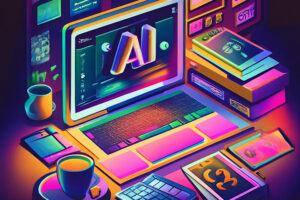The integration of Artificial Intelligence (AI) in manufacturing is not just a trend, but a revolution reshaping industries worldwide. Ever wondered how the use of AI in manufacturing can significantly enhance productivity and efficiency? In this article, we delve into various facets of this transformation.
We will explore the practical applications of AI in manufacturing, such as predictive maintenance, process automation, and quality control. By understanding the basics, you’ll be well-equipped to leverage AI effectively.

The Role of AI in Manufacturing
The core of AI in manufacturing involves significant automation and optimization of processes. Manufacturing companies are increasingly adopting AI tools to minimize human error and enhance product quality.
Key Areas of Application
- Predictive Maintenance: AI systems can forecast machinery failures before they occur, reducing downtime and improving efficiency.
- Quality Assurance: AI technologies, like computer vision, are employed to spot defects with higher precision than human inspectors.
- Supply Chain Optimization: AI algorithms streamline logistics, ensuring raw materials and products are at the right place at the right time.
Benefits of Integrating AI
The benefits of AI in manufacturing extend beyond productivity boosts. AI contributes to a safer workplace by taking over dangerous tasks and reducing the need for human intervention in hazardous processes.
Enhanced Productivity
AI systems rapidly execute repetitive and perilous tasks, freeing up human resources for more critical thinking roles, leading to a significant productivity boost.
Improved Quality Control
Implementing AI for quality checks guarantees higher standards of product consistency. By employing AI tools, manufacturers achieve superior accuracy and efficiency.
Examples and Case Studies
Recent advancements in AI have seen notable applications in prominent manufacturing giants. For instance, companies like Tesla utilize AI-driven robotics for intricate assembly processes, thus ensuring precision and quality in their vehicles.
AI for coding
Understanding how to implement AI in everyday processes can be enhanced by learning through coding applications where AI dictates outcomes.
AI chatbots in Manufacturing
Though their primary use is in customer service, AI chatbots are increasingly applied within manufacturing settings to streamline communications.
Adopting AI Tools
Adopting AI technologies in manufacturing processes involves understanding which areas of operations can benefit most. It requires a tailored approach, considering both the scale and specificity of manufacturing needs.
Getting Started
Keep abreast of the latest AI tools and integrate them into your processes for maximum results. Refer to these AI tools that are amazingly beneficial for potential applications.
AI in imagery
Manufacturers are using AI-generated images for creating prototypes, leading to faster design cycles and innovative product development.
The Future of AI in Manufacturing
The future is bright for AI in manufacturing. With ongoing advancements, the industry anticipates new improvements in personalization, product design, and customer interaction. AI will continue transforming the ways businesses operate, making them more efficient and resilient.
Challenges and Considerations
Despite its many advantages, AI implementation has challenges, including high initial costs and the need for skilled workers to oversee AI systems. Address these by ensuring your workforce receives adequate training on new AI technologies.
Privacy Concerns
As more data becomes integrated into AI systems, ensuring the privacy and security of sensitive information is critical.
Innovation and Collaboration
Encouraging collaboration between technology developers and manufacturers is essential for fostering innovation. This synergy will drive the AI revolution in manufacturing faster and more effectively.
Open Innovations
Pushing the boundaries through open innovation and sharing AI advancements can further enhance how we approach task automation and improve manufacturing processes.
Conclusion
As AI continues evolving, it ushers in an era of transformation for industries worldwide. Those invested in discovering how to use AI in manufacturing will position themselves as frontrunners in capturing future market opportunities.

FAQ Section
What industries benefit most from AI in manufacturing?
All industries involved in production, notably automotive, electronics, and consumer goods, can reap massive benefits.
How does AI help in predictive maintenance?
AI algorithms analyze data trends to forecast machinery issues, thus preventing unexpected downtimes.
Are AI solutions feasible for small manufacturers?
Yes, with increasingly affordable options and scalable solutions, even small manufacturers can implement AI.







